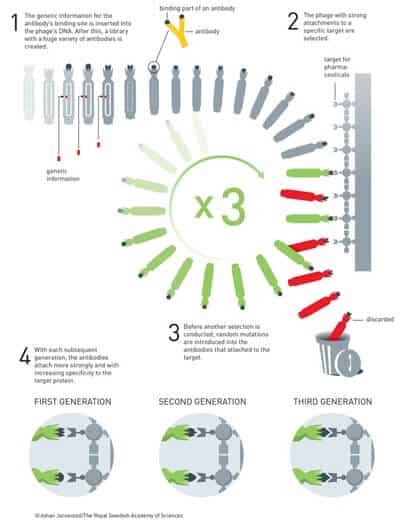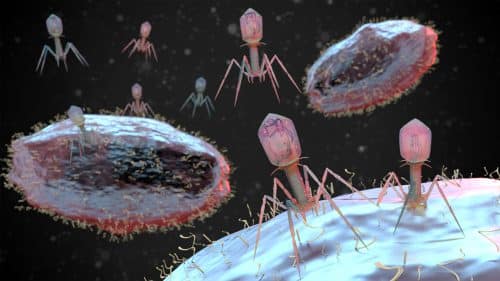Half of the prize is awarded to researcher Frances Arnold from the California Institute of Technology (Caltech) in the USA for developing a method for the accelerated production of enzymes in vitro in a process of evolutionary selection. Half of the prize is divided between the two researchers George Smith (Smith) from the University of Missouri in the United States and Gregory Winter from the University of Cambridge in the United Kingdom for using viruses that attack bacteria (bacteriophages) to produce proteins, including antibodies of the immune system

1. The genetic information used to express the binding site of the antibody is inserted into the DNA of the bacteriophage. In the next step, a library with a wide variety of antibodies is produced.
2. Among the library of bacteriophages, those with the strongest link to a specified target are selected.
3. Before performing further selection, random mutations are induced in those antibodies bound to the targets.
4. With each additional generation/cycle, the selected antibodies bind more strongly to their protein targets due to higher selectivity. Illustration: Nobel Prize Committee
The Nobel Prize in Chemistry for 2018 was awarded to three researchers (two from the USA and one from the UK) for the development of development processes in vitro at a fast pace, a field known as "accelerated evolution". Half of the prize is awarded to researcher Frances Arnold from the California Institute of Technology (Caltech) in the USA for developing a method for the accelerated production of enzymes in vitro in a process of evolutionary selection. Half of the prize is divided between the two researchers George Smith (Smith) from the University of Missouri in the United States and Gregory Winter from the University of Cambridge in the United Kingdom for using viruses that attack bacteria to produce proteins, including antibodies of the immune system.
Harnessing the power of evolution
The power of evolution is revealed when you look at the variety of living things. The bride and groom of the 2018 Nobel Prize in Chemistry took control of the mechanism of evolution and used it for the purpose of advancing humanity. Enzymes produced by direct evolution are used to make a variety of products important to humanity, from biofuels to medicines. Antibodies produced in a process of evolution using a method known as a 'bacteriophage library' are able to fight auto-immune diseases and in some cases even cure metastatic cancer.
Since life evolved on Earth about 3.7 billion years ago, almost every crevice in our planet has been filled with different creatures. Life spread and reached everywhere - hot springs, the depths of the oceans and arid deserts, all thanks to the fact that evolution managed to overcome a number of chemical bumps. The tools of life - proteins - have undergone optimization, changes and innovations over the years, while receiving an outstanding variety of living beings.
The winners of this year's Nobel Prize in Chemistry were inspired by the power of evolution and used the same principles - genetic change and a stage of selection - to develop proteins important to humanity.
Half of the prize is awarded to the researcher Frances H. Arnold. In 1993, she performed the first experiment of direct evolution of enzymes, which are those proteins that catalyze chemical reactions. Since that experiment, she has improved these methods which are now commonly used for the development of new catalysts. Applications of Arnold's enzymes include more environmentally friendly production of chemical components, such as pharmaceuticals, and the production of renewable fuels for the transportation sector.
The second half of the Nobel Prize in Chemistry for this year is awarded toGeorge F. Smith and remove Gregory Winter. In 1985, George Smith developed an elegant method known as the 'bacteriophage library' in which a bacteriophage (a virus that feeds on a bacterium) can be used to develop new proteins. Gregory Winter used this method to obtain direct evolution of antibodies, with the aim of preparing new drugs. The first drug based on this method, Adalimumab, was approved back in 2002 and is used as an anti-inflammatory drug. Since then, the method has enabled the production of antibodies capable of neutralizing toxins, inhibiting autoimmune diseases and even curing metastatic cancer.
The announcement of the prize committee reads: "We are currently standing in the first days of the revolution of direct evolution that can, in countless ways, give rise to the greatest benefits for humanity - in light of Alfred Nobel's vision."

More of the topic in Hayadan:
